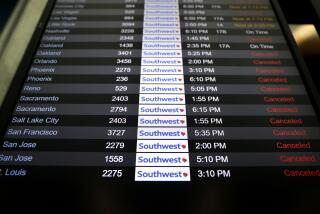Rolling Hills Consultant Awarded $260,000 in Western Airlines Suit
A Torrance jury has awarded a Rolling Hills business consultant more than $260,000 in damages after he sued Western Airlines, alleging that the airline reneged on an agreement for him and his family to receive free flights for five years.
After a two-week trial in Torrance Superior Court, jurors on Wednesday awarded the money to Bart Cleveland, 50, who was hired as an executive consultant by the airline in July, 1982, to cut costs on aircraft maintenance contracts.
“This has been a four-year struggle,” Cleveland said in an interview. “Basically Western put up a stone wall with no doors in it. They had a contract and they didn’t want to honor it.”
Western’s attorney, Martin Spear, declined comment except to say no decision has been made on whether the verdict will be appealed.
The eight-woman, four-man panel deliberated 15 minutes before reaching its unanimous decision.
Events Described
Michael Whitehill, Cleveland’s attorney, gave this account:
In July, 1982, Cleveland agreed to work for the airline for one year at $24,000 in salary--$20,000 of which was to be paid to him the first year and the rest over four years. In addition, he was to receive five years of free flights on Western flights and reduced fare on other airlines for himself and his immediate family--a perquisite the airline’s top executives typically receive.
Cleveland accepted the arrangement--basically a deferred compensation deal--because Western was having financial troubles, Whitehill said. No formal contract was signed, but the arrangement was spelled out in a memo that was placed in Cleveland’s personnel file.
Cleveland worked at the airline for one year, and saved the company an estimated $2.5 million by changing the way it awarded its maintenance contracts, Whitehill said. He also flew to Hawaii “a number of times,” as well as other places such as Acapulco and Salt Lake City.
Refused Additional Pay
After the year was up and Cleveland left Western, the company contended the contract was for one year and refused to pay him the additional $4,000 or extend the travel benefits.
During the trial, the Western executive who wrote the memo--who left the company and now lives in Alaska--testified via videotape that the contract was for five years. An economist hired by Cleveland estimated that he was entitled to $260,594 in compensatory damages--a sum based on the number of flights Cleveland took during the first year of his contract and what he would have had to pay for a similar number of flights over a four-year period.
In the interview, Cleveland could not recall how many flights he took during the year but estimated it was about 30.
More to Read
Inside the business of entertainment
The Wide Shot brings you news, analysis and insights on everything from streaming wars to production — and what it all means for the future.
You may occasionally receive promotional content from the Los Angeles Times.










